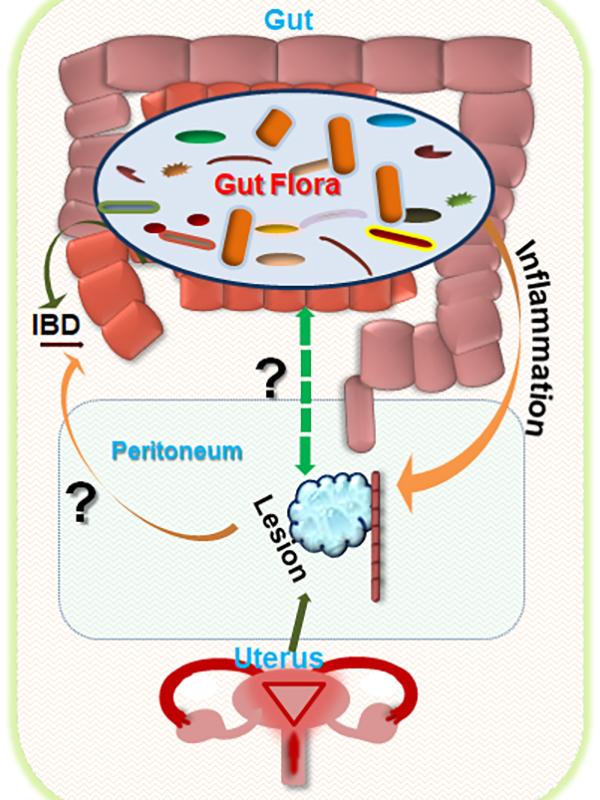Targeted treatment reduces number of disease-causing microbes in mice

Credit: Kommagani lab/Washington University
Researchers at Washington University School of Medicine in St. Louis have found, in mice, that treatment with an antibiotic reduces the size of lesions caused by endometriosis.
The researchers are planning a large, multicenter clinical trial to test the drug metronidazole in women who have the painful condition.
The study is published online April 30 in the journal Human Reproduction.
Endometriosis is a chronic problem for up to 10 percent of women ages 25 to 40. About 5 million women in the United States and an estimated 176 million women worldwide are believed to be affected. The condition results from uterine cells migrating upward into the stomach area, where those cells clump together to form lesions. In addition to pain, endometriosis often contributes to fertility problems. Current treatment strategies include hormone therapy and surgery, but both approaches involve significant side effects and recurrence after treatment.
Studying mice, the researchers found that treating the animals with metronidazole reduced the size of endometriosis-related lesions in the gut. That was true whether treatment was started before the lesions began forming or after endometriosis already was well-established. The findings also suggest that bacteria in the gut microbiome may help drive, or prevent, progression of the disease.
“Our initial goal was to understand how these gut bacteria, or microbiota, might be connected to endometriosis, but in the process, we may have found a cost-effective treatment,” said principal investigator Ramakrishna Kommagani, PhD, an assistant professor of obstetrics and gynecology at Washington University’s Center for Reproductive Health Sciences.
Scientists already knew that young women and girls with increased susceptibility to inflammatory bowel disease were more likely to develop endometriosis.
The researchers in the new study found that some of the gut microbes linked to bowel problems also feature prominently in endometriosis. When they treated the mice with the broad-spectrum antibiotic metronidazole, the lesions became smaller. Inflammation also was reduced.
Interestingly, other antibiotics tested in the study — ampicillin, neomycin and vancomycin — did not lessen inflammation or shrink lesions. In addition, Kommagani’s team found that levels of a protective type of gut bacteria were very low in the mice with endometriosis, so they believe that in addition to antibiotics, it may be possible to use probiotics to boost levels of protective bacteria.
“This study is exciting as it opens new frontiers in identifying bacterial candidates that can promote endometriosis in reproductive-age women, and it enables us to conduct future studies aimed at developing simpler ways to diagnose endometriosis,” said co-author Indira Mysorekar, PhD, the James P. Crane Professor of Obstetrics and Gynecology, and a professor of pathology and immunology. She is director of the Center for Reproductive Health Sciences.
“How healthy your gut is affects your disease burden,” Kommagani said. “What you eat can affect the bacteria in the gut, and that can promote endometriosis, so it’s important to have healthy habits and to make sure you are harboring good bacteria so you won’t get the disease and the pain associated with it.
“This is a silent epidemic in that often women think they are just having cramping during their menstrual cycles,” he added. “It’s only when the pain reaches a point where they can’t handle it — and it’s not contained within the cycle — that many realize something else is going on.”
###
Chadchan SB, Cheng M, Parnell LA, Yin Y, Schriefer A, Mysorekar IU, Kommangani R. Antibiotic therapy with metronidazole reduces endometriosis disease progression in mice: a potential role for gut microbiota. Human Reproduction, April 30, 2019.
This work was supported by the Eunice Kennedy Shriver National Institute of Child Health and Human Development, a National Cancer Institute grant to the Siteman Cancer Center, and the National Center for Advancing Translational Sciences of the National Institutes of Health (NIH). Grant numbers R00 HD080742, R01 HD091218, P30 CA91842 and UL1 TR002345. Additional funding from an Endometriosis Foundation of America Research Award.
Washington University School of Medicine’s 1,500 faculty physicians also are the medical staff of Barnes-Jewish and St. Louis Children’s hospitals. The School of Medicine is a leader in medical research, teaching and patient care, ranking among the top 10 medical schools in the nation by U.S. News & World Report. Through its affiliations with Barnes-Jewish and St. Louis Children’s hospitals, the School of Medicine is linked to BJC HealthCare.
Media Contact
Jim Dryden
[email protected]




